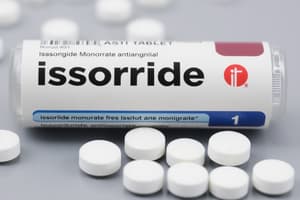Podcast
Questions and Answers
What is the drug classification for Isordil?
What is the drug classification for Isordil?
- Nitrate (correct)
- Beta-blocker
- ACE inhibitor
- Calcium channel blocker
What are the common generic names or trade names for Isordil?
What are the common generic names or trade names for Isordil?
Isosorbide dinitrate/Isordil
What is the usual dosage range for Isordil when taken orally?
What is the usual dosage range for Isordil when taken orally?
PO 5-20 mg bid
Why is a client receiving Isordil?
Why is a client receiving Isordil?
How does Isordil work?
How does Isordil work?
What are the common side effects of Isordil?
What are the common side effects of Isordil?
What actions should a nurse take specific to Isordil?
What actions should a nurse take specific to Isordil?
What should a nurse teach a client about Isordil?
What should a nurse teach a client about Isordil?
Which medications may interact with Isordil?
Which medications may interact with Isordil?
Flashcards are hidden until you start studying
Study Notes
Isordil Overview
- Classification: Nitrate, used primarily to manage angina pectoris.
Common Names
- Generic Name: Isosorbide dinitrate
- Trade Name: Isordil
Dosage Information
- Typical Oral Dosage: 5-20 mg administered twice daily (bid).
Indications
- Primary Use: Treatment of Angina Pectoris to alleviate chest pain.
Mechanism of Action
- Function: Relaxes vascular smooth muscle.
- Effects: Decreases both preload and afterload, resulting in reduced cardiac oxygen demand.
Side Effects
- Common Reactions:
- Vascular headache
- Dizziness
- Orthostatic hypotension (drop in blood pressure upon standing)
- Flushing
- Methemoglobinemia (a condition that affects blood's ability to carry oxygen).
Nursing Responsibilities
- Pain Assessment: Monitor for duration, intensity, and onset of pain.
- Orthostatic Hypotension Monitoring: Check for signs of low blood pressure when the patient changes positions.
- Methemoglobinemia Assessment: Look for symptoms such as cyanosis of the lips, nausea, vomiting, and signs of shock.
Patient Education
- Medication Compliance: Instruct patients to take prescribed doses consistently; avoid skipping or doubling doses.
- Substance Interaction: Advise against alcohol and certain over-the-counter medications that may interfere with treatment.
- Withdrawal Precautions: Warn against sudden discontinuation to prevent potential heart issues.
Drug Interactions
- Alcohol: Increased risk of hypotension.
- Sidenafil: May lead to fatal hypotension when taken concurrently with Isordil.
Studying That Suits You
Use AI to generate personalized quizzes and flashcards to suit your learning preferences.

